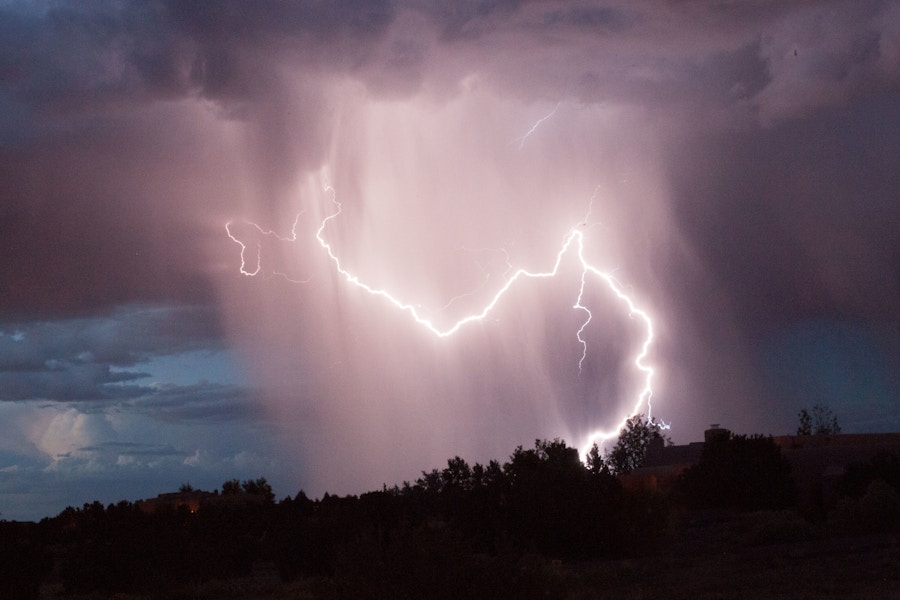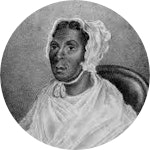Introductory Note:
Rebecca Cox Jackson (1795-1871) was a Black freewoman who came into faith in a Holiness Methodist communion. Autobiographies from other Black women of her time affirm that this tradition, particularly, with its dual emphasis on direct relationship with God and sanctification, as well as its acknowledgment of the preaching and prayer gifts of women, was for them a haven, as it was for Jackson. As evangelist Amanda Smith commented in 1893, “I think some people would understand the quintessence of sanctifying grace if they could be black about twenty-four hours.” Unlike most of her peers, Jackson was led into Shaker life, eventually founding a Shaker mission to Black people in Philadelphia.
In 1830, Jackson had a mountaintop experience during a thunderstorm, in which she heard and recognized for the first time God’s voice. He was speaking against a spirit of temptation and terror, leading her into trust and safety. Jackson’s desire to hear His voice never left her, and she was in consistent relationship with the Father and the Spirit for the rest of her life. The following excerpt from her brutally honest spiritual autobiography gives the reader a small taste of Jackson’s vivid prayer life, her transforming relationship with the Trinity, and the love of enemy to which she was unfailingly led. The excerpt begins just after the thunderstorm.
Elane O'Rourke
[After my brother kneeled with me] I lifted up my voice in prayer, in thanks to Almighty God who had heard my prayer for Christ’s sake. I then felt a desire of all the world to come and love God for Christ’s sake. I thought by faith I saw the blessed Jesus who placed my case before the Father, pleading for all sinners. And my soul ran out after sinners and a‑special after those who had done me wrong and I had never forgiven them…I prayed for them that morning and I felt I could go to them and kneel down and pray for them and take them in my arms. I loved them as I did my friends…
But I felt at the same time not to tell anybody what the Lord had done for me. I was afraid of becoming a Pharisee. And I thought if I lived according to the gift of God to me that morning, it would be seen in my life. And I would pray to God from this time in secret for this people who I felt so much about, and that God who heard in secret will answer in His own time…
I rose up and went about my work with care and in fear lest I should offend in word or deed. I saw at once that the mind I had would not do, so I prayed to God to give me a strong mind that I might be able to serve Him with all my days, with all my heart, soul, mind and strength. And this brought me right home into my own heart and I kept praying in my own heart for this people…. I felt that the Lord had done so much for me, I wanted to make some return. It was spoke in my mind, “Rise at the break of day and wait on the Lord in prayer.” “I will.”
Soon after, as Jackson is learning to hear and heed the voice of God, Jackson listens to a voice of fear — her own — and disobeys the leading she had received. Two people for whom she had prayed healing died. Leaving the house of the second, Jackson is convicted.
I now looked at myself as the most ungrateful wretch. I knowed not how to approach a throne of grace, to dare to lift up my heart in prayer to that merciful God, whom I had so cruelly disobeyed, through fear and great ignorance of the nature of his Spirit. I looked at these two precious souls to whom I was sent with a message. Their death proved to me, without a doubt, that the message was from God and to me, and I unworthy of it. I kneeled as one under the sentence of death. There was one thing I did know and that was this — God knowed my whole heart, and if I had a desire on earth, it was to do His holy will in all things, if I only could know His Spirit from all others. Herein I saw, at the beginning, the mind I had would not do. Therefore I prayed to the Lord to give me a strong mind, that I might be able to do His will in all things.
I now poured forth my soul in solemn prayer to Almighty God, if it was consisting to His holy will, to forgive me this my great sin of ignorance the then give me a true knowledge of His Spirit from all other spirits, “I will obey Thee in all things, in all places, and under all conditions.” And while my soul was thus humbled…I saw in vision the Savior…He looked me in the face and smiled…Oh, the love, joy and sympathy that my soul was filled with! I cried for very joy. I felt a thankfulness I could not express….
I felt now to begin to fast and pray the three first days in every week, and to inquire of the Lord from day to day to know His will concerning me…I had started to go to the promised land and I wanted husband, brother, and all the world to go with me, but my mind was made up to stop for none. I saw the time was short in that I had a great deal to do before I should be ready. For the more I was blest, the more I saw my unfitness. Yet I felt my daily justification before God, by obeying all that He required of me. And here I saw it was a growth…I loved all, friend and foe, saint and sinner, and God enabled me to manifest that love in all my conduct, which frequently disarmed my persecutors, know that my principle by nature was to revenge all that troubled me….
There was nothing in my nature contrary to the work of God [that he didn’t show] to me, and in a way so simple I could not misunderstand. I was told I must not speak of anybody’s faults, but pray for them. I must never let the sun go down and I feeling hard at anyone that had done anything to me however cruel or unjust. I must go and pray for them till I felt sorry for them and loved them as though they had done nothing. Then I might pray for myself. For my prayers could not be heard for my own soul, until I loved and prayed for all my enemies.
These things waked in my soul a new scene, and every word was sealed on the table of my spiritual heart. They are ever before my spirit eye, and they have been the treasure of my soul.
Jackson, Rebecca. Gifts of Power: The Writings of Rebecca Jackson, Black Visionary, Shaker Eldress, edited by Jean McMahon Humez (Amherst, MA: Univ. of Mass. Press, 1981), 71 – 88, excerpted and footnotes omitted.


